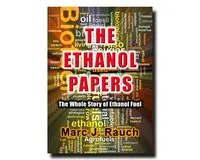Going Head-to-Head-to-Head on Ethanol with Chris Edwards (and Nick Loris)
 |
By Marc J. Rauch
Exec. Vice President/Co-Publisher
THE AUTO CHANNEL
 Marc Rauch |
Chris Edwards is the director of tax policy studies at Cato Institute and editor of the DownsizingGovernment.org website. His bio states that "he is a top expert on federal and state tax and budget issues. Before joining Cato, Edwards was a senior economist on the congressional Joint Economic Committee, a manager with PricewaterhouseCoopers, and an economist with the Tax Foundation."
 Chris Edwards |
June 23
Hi Chris -
I just came across the ethanol subsidies story that you wrote and published on the CATO website in 2017.
I understand that the story was from two years ago, but it was as incorrect when you published it then as it is now. For a guy who is supposed to understand tax policies, you should be embarrassed for writing
it and allowing it to remain online.
Have a great week.
Marc Rauch
THE AUTO CHANNEL
Marc - Thanks for your interest.
But your email does me no good if you don't tell me what's wrong with our piece.
If you let me know the particular items that are incorrect, I'd be happy to fix them.
Regards,
Chris
June 24
Hi Chris -
Thanks for your quick reply.
It appears to me that the only two points you address yourself are the issues of "ethanol subsidies," and a "biofuel mandate." The rest of the points are references to either Carl Icahn's
and Nic Loris' opinions.
Icahn's comments that "the RFS has created a bureaucratic market in tradable credits full of manipulation, speculation and fraud with the potential to destroy Americas oil refineries, send gasoline
prices skyward and devastate the U.S. economy" are humorously ironic because as the investor that he is, he would know full well that the entire stock and commodities markets are little more than bureaucratic
morasses of manipulation, speculation and fraud. Perhaps Icahn was intending his comments not to be of a derogatory nature, but rather a promotional assurance that other investors will be able to find themselves
right at home?
Incidentally, as you should know, the oil industry has never needed any help to find reasons to send fuel prices skyward and to devastate the U.S. economy. Clearly, Standard Oil, the "baby Standards,"
and the other so-called American oil companies never held any allegiance to America and the citizens of our country. They have always been for themselves.
As for Nick Loris' comments (as stated in his article at the Downsizing Government website),
he demonstrates that he is only capable of quoting from others' works and that he seems to be devoid of any personal or practical knowledge of any of the many individual issues related to fuels, engines, and
mechanics. I did tell him this directly in an email I sent to him at the Heritage Foundation back in April. He never replied. Maybe he'll reply to this as I am cc'ing him.
Regarding the two points you address: There are no ethanol subsidies, and none existed when you wrote the 2017 article. The subsidy that did exist, that many people purposely try to claim is an ethanol subsidy,
wasn't a subsidy that went to either ethanol-crop farmers or to distillers, it went to oil industry blenders to "compensate" them for losing profit because they had to substitute ethanol for a small
portion of gasoline in every gallon. The funny part of the end to this subsidy a few years before your article is that it was brought about because the oil industry "bit their nose to spite their face"
in the hope that the removal of the blenders subsidy would cause ethanol-gasoline prices to rise and that consumers would rebel. Prices at the pump didn't increase, and there wasn't any consumer rebellion.
Blenders lost money on the deal.
To the biofuel mandate, based upon what I imagine was your take from Nick Loris' article, you wrote "Individuals and markets can make more efficient and environmentally sound decisions regarding biofuels
without subsidies and mandates." It's a nice high-sounding comment, but it's not based on any reality. Except for the very brief periods in which burdensome taxes and outright alcohol prohibition
didn't keep individuals from using ethanol, there was no open opportunity for individuals and markets to make more efficient and environmentally sound decisions about the fuels. Gasoline, with it's many
additional poisonous additives, was shoved down our throats. Today, while it may be said that consumers now have a choice, it's still not true because there are restrictions on blend levels, phony warranty warnings,
and consumers are faced with the vestiges of the old lies told to denigrate ethanol. When combined with new prevarications about ethanol (such as those in Loris' article), people continued to be frightened away
from using ethanol and ethanol-gasoline blends.
I set all this out in a 641-page book I published online last October. The book is titled "THE ETHANOL PAPERS." It is available to read
HERE.

If the information I provide in the book helps you to understand the issues better, and you can make fixes to your old articles that would be good. If you disagree with me and want to challenge my comments and
opinions, I welcome it. At the worst, I'll learn something(s) new and then fix what I wrote. Since I'm not a farmer, a distiller, a fuel distributor, or a fuel retailer (and I own no shares in any biofuel
company), my interest is purely in freeing America from foreign domination of any kind.
Regards.
Marc
THE AUTO CHANNEL
OK.
Thanks for the link Marc. If I address the issue again, I will take a read.
A couple of quick points.
Nick and I use the word subsidies broadly to include mandates or regulations. You can design a regulation and a cash subsidy to have the same (distortionary) impacts on a market. Another example is the solar
power mandates in states such as California. These are effectively a giveaway to solar power producers, which or not actual cash is handed out.
You seem to ascribe nefarious motives to everyone in private markets (except ethanol producers) while assuming that government policy is run in the public interest.
Icahns comments of course were self-interested. The question is whether he was right about the bureaucracy of the tradable credits.
If you think that gasoline has poisonous additives, it would seem you should be making an environment case about tougher emission controls, which are certainly reasonable above certain thresholds.
Why not just let consumers decide whether they want ethanol or not?
Chris
Hi again Chris -
I sincerely thank you for your latest reply because when combined with the information contained in our earlier correspondence it will be very instructive to persons not fully knowledgeable in the overall issue.
I also believe that should you decide to address the overall issue again in the future that you may find my forthcoming responses helpful to you.
I agree that the word "subsidy" can broadly include any and all types of allowances, credits, inducements, refunds, exemptions, and cash payments. However, the problem is that when combined with
words and phrases such as "Time to repeal ethanol subsidies" and "let consumers decide whether they want ethanol or not," as you have in your original editorial and then in the responses
to me, it makes people think that there is some special subsidy that is being given to the ethanol producers/farmers that is not available to the petroleum oil industry; and that this special subsidy somehow
tips the scales in favor of ethanol...and to the direct financial detriment of the consumer.
However, as I'm sure you must know, the oil industry receives far more allowances, credits, inducements, refunds, exemptions, and cash payments than the ethanol industry, and that some of these oil
industry subsidies have been in existence for 100 years and more.
Personally, I'm of the opinion that all "subsidies" should be stopped, to every industry. I believe that all financial aid to foreign countries should be stopped, regardless of the country.
I also believe that there should be completely open free markets, and that consumers should have unrestricted access to all products, with the only exception being products that can cause death and/or permanent
illness or disability (and even in these cases, a good stiff warning with notification of limited liability may be sufficient rather than a forced ban).
Consequently, if we are to seriously consider a statement like "remove the subsidies and let consumers decide," I believe that consumers will choose ethanol over gasoline and petroleum diesel fuel
because the true retail price of gasoline and diesel would be 2, 3, 4 times that of ethanol. I especially believe this if the oil industry was cut off from using the U.S. Military as its own personal security
force (in addition to removing all the other subsidies) and had to pay for the security themselves.
In my writings, I don't deny that there are general subsidies that are allowed to individuals and entities engaged in farming; but I explain that these subsidies are available to farmers (for example)
regardless of the crops they grow - and that they may even grow corn, but that the corn they grow is specifically for human consumption and not for ethanol fuel. I would like the same consideration when an
ethanol opponent tries to single out ethanol producers.
I do apologize if you think I unfairly ascribe nefarious motives to different people and entities. I think that if you ever have the chance to read my book that I can be quite fair in castigating both sides
(even all sides) of any issue. I favor a small government...a small, strongly capitalist government.
As it pertains to ascribing nefarious motives to just the oil industry (vs. the ethanol industry, for example), I'll explain it this way: If you can tell me which American ethanol producer colluded with
the Germans at the expense of America and the the Allies leading up to and during the First World War, I would be happy include them in my criticisms. If you would identify which ethanol producer colluded with the Nazis
leading up to and during the Second World War at America's and the Allies' expense, I would most definitely include them in my condemnations. If you would tell me which ethanol producer lied to the
American government and people for decades about the danger of the ingredients used in ethanol fuel...and hid the fact that simply touching the ingredient(s) could cause death or permanent disability, I would
make this nefarious deed known alongside that of the dangers related to the use of tetraethyl lead (TEL) in gasoline.
I know that drinking too much ethanol (in beverage form) can sicken or kill a person, but I also know that almost any amount of gasoline, benzene, toluene, xylene, tetraethyl lead, or ethylene bromide that's
consumed by a person could kill him or her. With this in mind, I admit to having far more disdain for petroleum oil fuels than I do for sugar-based distilled fuels.
By the way, I hope you know that there was a time when the Federal Trade Commission would not allow producers of non-leaded gasoline to advertise the dangers of TEL in the gasoline sold by Standard Oil and its
licensees - I'm not talking about inventing dangers of leaded gasoline, I'm talking about factual dangers related to the use of leaded gasoline. The financial power of the leaded gasoline companies was so
strong that they could buy the FTC's assistance.
So, I'm okay with the idea of allowing the public to decide, as long as the public is given the facts and doesn't have to continue wading through a river of one-sided lies, exaggerations, and political
protection that has coddled the oil industry for the past century and a half.
Regards.
Marc
THE AUTO CHANNEL
End of correspondence, no additional response from Chris Edwards and none ever from Nicholas Loris.


